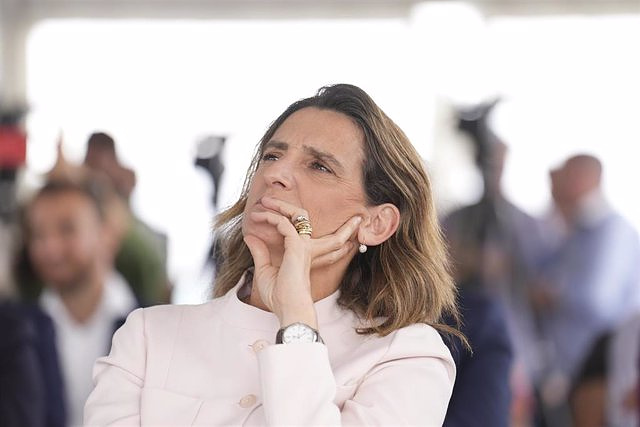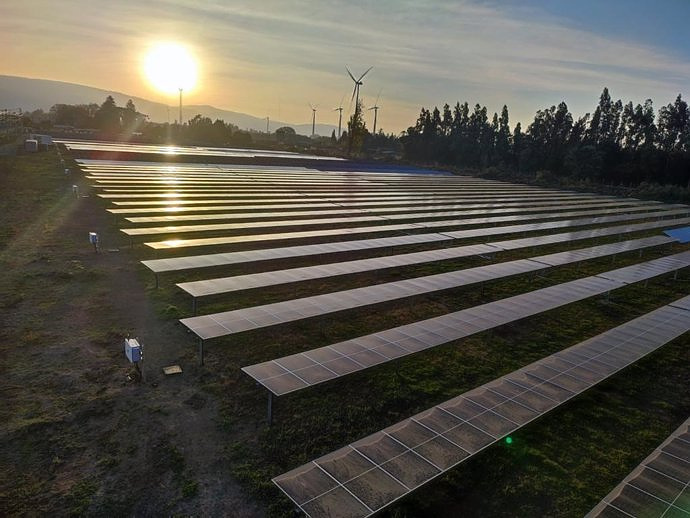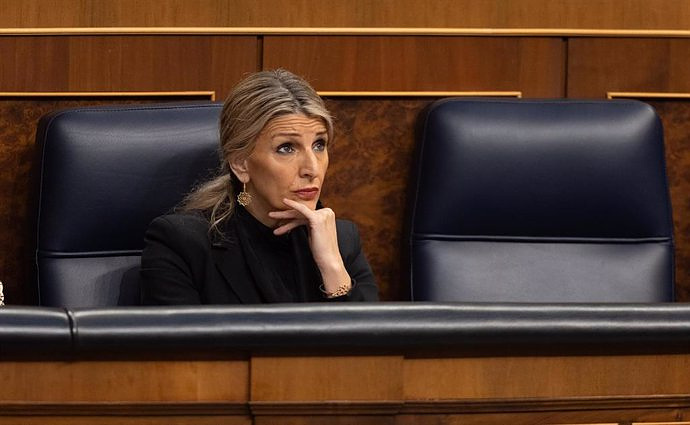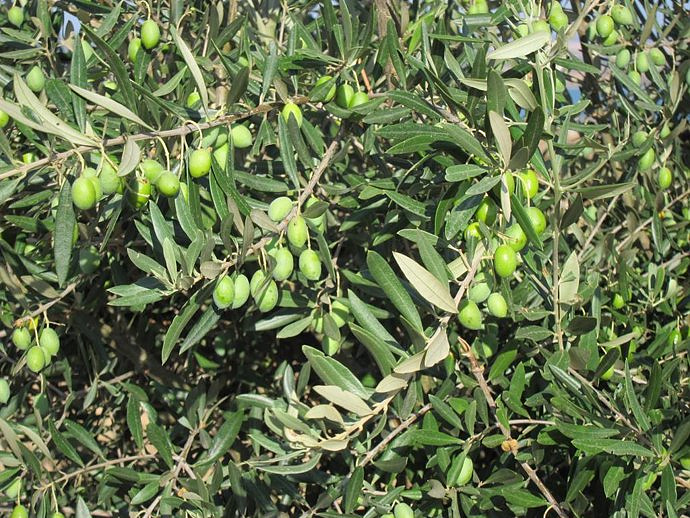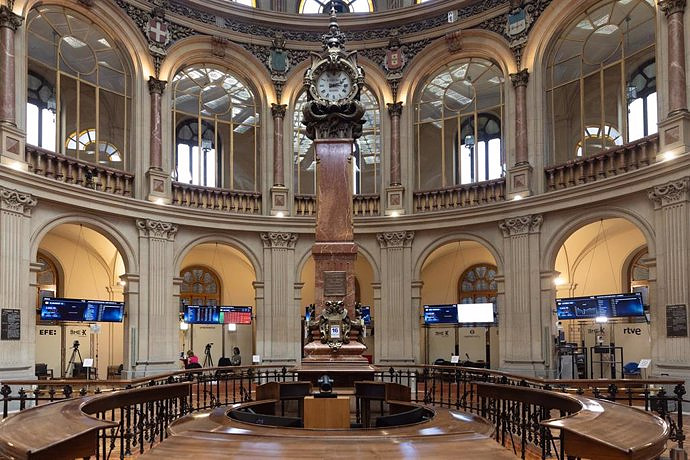Invites a "cautious driving" that saves fuel without the need for an express limitation of speed
MATAPOZULEOS (VALLADOLID), 1 Aug. (EUROPE PRESS) -
The Third Vice President of the Government and Minister for the Ecological Transition and the Demographic Challenge, Teresa Ribera, explained that Spaniards "will not be cold" at home during the winter and has appealed to the individual contribution that each citizen can make to save energy.
During a visit to the town of Matapozuelos in Valladolid, hours before the Council of Ministers meets to approve a package of urgent energy saving measures, Ribera insisted that the "most important" message is that "in such a complicated context it is about "helping the neighbors of the European Union" and "how to avoid the risk of rationing".
Although the package of measures that the Council of Ministers will approve this Monday will focus on energy savings in public buildings, the vice president stressed that it is a first step towards a "much more complete and strategic" plan for the country as a whole which will be presented in September. "What we do today above all has to do with what things are relatively simple and can be applied immediately," she said.
In any case, the person in charge for the Ecological Transition has stressed that a situation of supply cut is not contemplated and has defended that it is not so much a matter of emphasizing what is mandatory, but rather that in a situation like this "it is reasonable and positive" to contribute what each one can in their "daily behavior".
In addition, he has assured that he believes that the Spanish "are not going to be cold" in their homes next winter, since Spain does not present the problems that do occur in other countries of Eastern and Northern Europe. "In our case, supply is guaranteed, we have a different profile, but it is important to insist on the call so that we can contribute to the extent that we can," stressed Teresa Ribera, who has advocated making thermal comfort measures compatible with "intelligent and efficient" of an energy resource that can make it easier for neighboring countries to access what is not consumed here, something that can happen in winter, he exemplified, by wearing "a comfortable sweater or a coat".
In this objective, the vice president has defended the importance of the collaboration of all the administrations and the private sector, on which she has defended that the conversations held with the employers for the application of these measures have had a "positive" reception.
"That does not mean that I agree, but I would like to emphasize that there is a vast majority of people and institutions that understand and want to contribute to what should be a collective effort," Ribera added.
Lastly, the vice-president referred to the possibility of reducing speed on dual carriageways and motorways as an energy-saving measure to recall that this is not a tool that is going to be discussed in this Council of Ministers, but that although there is no "express limitation", "cautious driving" contributes to a reduction in fuel needs.
"Just as changing a degree in the thermostat can lead to a seven percent reduction in consumption, a reduction in speed can also lead to a significant reduction in energy consumption.

 Exploring Cardano: Inner Workings and Advantages of this Cryptocurrency
Exploring Cardano: Inner Workings and Advantages of this Cryptocurrency Seville.- Economy.- Innova.- STSA inaugurates its new painting and sealing hangar in San Pablo, for 18 million
Seville.- Economy.- Innova.- STSA inaugurates its new painting and sealing hangar in San Pablo, for 18 million Innova.- More than 300 volunteers join the Andalucía Compromiso Digital network in one month to facilitate access to ICT
Innova.- More than 300 volunteers join the Andalucía Compromiso Digital network in one month to facilitate access to ICT Innova.-AMP.- Ayesa acquires 51% of Sadiel, which will create new technological engineering products and expand markets
Innova.-AMP.- Ayesa acquires 51% of Sadiel, which will create new technological engineering products and expand markets The Ibex 35 signs its best session of the year with an increase of 1.7% and recovers 11,000 points
The Ibex 35 signs its best session of the year with an increase of 1.7% and recovers 11,000 points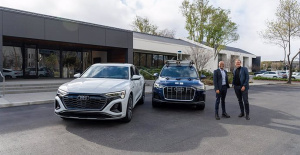 RELEASE: Applied Intuition and Audi Partner on Unified AD Launch Solution
RELEASE: Applied Intuition and Audi Partner on Unified AD Launch Solution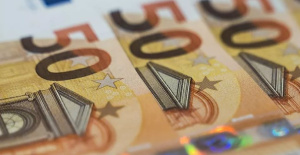 The European Parliament supports the new fiscal rules adapted to the situation by country
The European Parliament supports the new fiscal rules adapted to the situation by country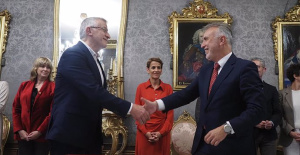 Agreement between the Government and Navarra to protect traffic competition in the community after the annulment of the Supreme Court
Agreement between the Government and Navarra to protect traffic competition in the community after the annulment of the Supreme Court How Blockchain in being used to shape the future
How Blockchain in being used to shape the future Not just BTC and ETH: Here Are Some More Interesting Coins Worth Focusing on
Not just BTC and ETH: Here Are Some More Interesting Coins Worth Focusing on Looking for video games that value the neighborhoods of Valencia
Looking for video games that value the neighborhoods of Valencia UPV researchers improve the efficiency of air conditioning systems using a geothermal heat pump
UPV researchers improve the efficiency of air conditioning systems using a geothermal heat pump València is committed to citiverse and smart tourism to be "the reference technological hub of the Mediterranean"
València is committed to citiverse and smart tourism to be "the reference technological hub of the Mediterranean" Valencia displays its "innovative and technological potential" at the Emerge Americas event in Miami
Valencia displays its "innovative and technological potential" at the Emerge Americas event in Miami A million people demonstrate in France against Macron's pension reform
A million people demonstrate in France against Macron's pension reform Russia launches several missiles against "critical infrastructure" in the city of Zaporizhia
Russia launches several missiles against "critical infrastructure" in the city of Zaporizhia A "procession" remembers the dead of the Calabria shipwreck as bodies continue to wash up on the shore
A "procession" remembers the dead of the Calabria shipwreck as bodies continue to wash up on the shore Prison sentences handed down for three prominent Hong Kong pro-democracy activists
Prison sentences handed down for three prominent Hong Kong pro-democracy activists ETH continues to leave trading platforms, Ethereum balance on exchanges lowest in 3 years
ETH continues to leave trading platforms, Ethereum balance on exchanges lowest in 3 years Investors invest $450 million in Consensys, Ethereum incubator now valued at $7 billion
Investors invest $450 million in Consensys, Ethereum incubator now valued at $7 billion Alchemy Integrates Ethereum L2 Product Starknet to Enhance Web3 Scalability at a Price 100x Lower Than L1 Fees
Alchemy Integrates Ethereum L2 Product Starknet to Enhance Web3 Scalability at a Price 100x Lower Than L1 Fees Mining Report: Bitcoin's Electricity Consumption Declines by 25% in Q1 2022
Mining Report: Bitcoin's Electricity Consumption Declines by 25% in Q1 2022 Oil-to-Bitcoin Mining Firm Crusoe Energy Systems Raised $505 Million
Oil-to-Bitcoin Mining Firm Crusoe Energy Systems Raised $505 Million Microbt reveals the latest Bitcoin mining rigs -- Machines produce up to 126 TH/s with custom 5nm chip design
Microbt reveals the latest Bitcoin mining rigs -- Machines produce up to 126 TH/s with custom 5nm chip design Bitcoin's Mining Difficulty Hits a Lifetime High, With More Than 90% of BTC Supply Issued
Bitcoin's Mining Difficulty Hits a Lifetime High, With More Than 90% of BTC Supply Issued The Biggest Movers are Near, EOS, and RUNE during Friday's Selloff
The Biggest Movers are Near, EOS, and RUNE during Friday's Selloff Global Markets Spooked by a Hawkish Fed and Covid, Stocks and Crypto Gain After Musk Buys Twitter
Global Markets Spooked by a Hawkish Fed and Covid, Stocks and Crypto Gain After Musk Buys Twitter Bitso to offset carbon emissions from the Trading Platform's ERC20, ETH, and BTC Transactions
Bitso to offset carbon emissions from the Trading Platform's ERC20, ETH, and BTC Transactions Draftkings Announces 2022 College Hoops NFT Selection for March Madness
Draftkings Announces 2022 College Hoops NFT Selection for March Madness